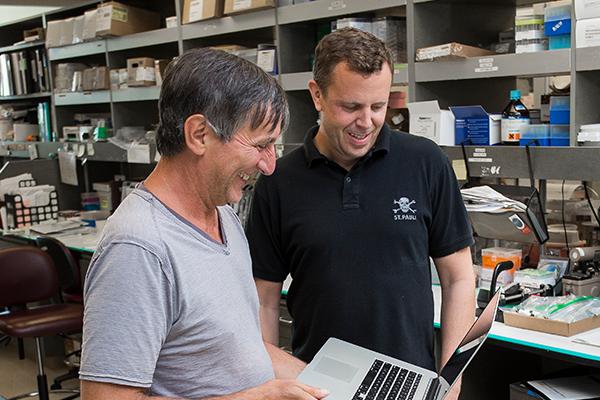
Credit: La Jolla Institute for Immunology
LA JOLLA, CA–La Jolla Institute for Immunology (LJI) has been awarded a $22 million contract renewal over seven years from the National Institutes of Health (NIH) to host and expand the Immune Epitope Database (IEDB). The database is the world’s most comprehensive collection of scientific data on how the immune system responds to a wide range of infectious agents, allergy-causing substances, and other stimuli that activate the immune system.
Co-led since its inception in 2003 by LJI professors Alessandro Sette, Dr. Sci.Biol., and Bjoern Peters, Ph.D., the IEDB gives biomedical researchers worldwide free access to a rapidly growing catalogue of epitopes–the specific, molecular structures that the immune system uses to tell friend from foe–involved in autoimmunity, infectious and allergic diseases, as well as organ and tissue transplantation.
The current seven-year renewal enables LJI to continue its role as host and developer of the IEDB through 2025. “At the end of the current funding period, the database will have been collecting data for almost a quarter century,” says Sette, professor and head of the Division of Vaccine Discovery. “NIH’s continued commitment and support is not only a testament to the quality and importance of this unique resource, but also a clear mandate to take the IEDB to the next level.”
As of January, 2019, the database contains over 530,000 epitopes representing some 3,600 different species–including humans, non-human primates, rodents, and other vertebrates–making it the largest data set of its kind. Bringing this vast amount of data together in a single resource allows researchers to unlock clues to the causes of disease by searching for commonalities and recurring patterns that differentiate them.
The IEDB has become an established and widely used resource, receiving hundreds of queries from researchers worldwide who are designing new or improved vaccines against infectious diseases, such as tuberculosis, and new treatments for autoimmune disorders, such as type 1 diabetes and multiple sclerosis.
In recent years, the explosion of increasingly large and complex data sets pouring out of labs and captured by the IEDB has created a new set of challenges. “Managing the massive amount of information has required the automation of processes and a rethinking of how the data is organized,” says Peters. “We have millions of records and the big question becomes how do we synthesize the information to go from data to knowledge? Going forward, that’s where our focus will be.”
In addition to collecting data, the IEDB also provides tools that allow researchers to make predictions about epitopes, which is particularly useful for newly emerging or constantly evolving infectious diseases, such as Zika and influenza, as well as ongoing biodefense concerns. Together, the database and the tools play a critical role in the fight to improve and safeguard global public health.
“Lessons learned in the context of infectious diseases have led to the development of tools that are now applied broadly to developing highly personalized immunotherapy treatments,” says Peters, a bioinformatician, who has developed a number of tools to predict and analyze which parts of a pathogen, allergen, or cancer cell are recognized and targeted by the immune system. “As we learn more about which features trigger a strong immune response, we can fine-tune our predictions.”
###
This project has been funded by the National Institute of Allergy and Infectious Diseases, National Institutes of Health, Department of Health and Human Services, under Contract 75N93019C00001.
About La Jolla Institute
The La Jolla Institute for Immunology is dedicated to understanding the intricacies and power of the immune system so that we may apply that knowledge to promote human health and prevent a wide range of diseases. Since its founding in 1988 as an independent, nonprofit research organization, the Institute has made numerous advances leading toward its goal: life without disease.
Media Contact
Gina Kirchweger
[email protected]
858-357-7481




